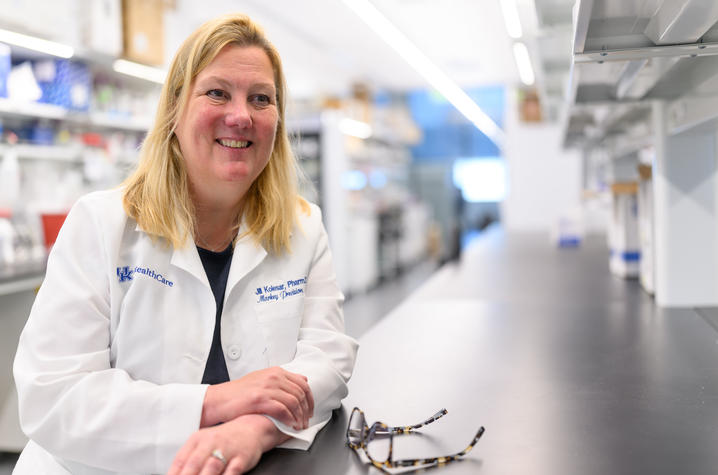Markey study shows expanded cancer gene testing feasible, beneficial for patients
LEXINGTON, Ky. (Feb. 23, 2024) — A new University of Kentucky Markey Cancer Center study published in JCO Precision Oncology demonstrates a feasible way to expand germline genetic testing for patients with cancer.
Germline testing analyzes an individual's DNA to identify inherited genetic mutations that increase the risk for cancer and other diseases. For patients with cancer, the tests can determine potential therapies and identify family members that would benefit from risk reduction strategies and early screening opportunities.
Current guidelines recommend germline testing for patients with certain cancers including ovarian, pancreatic, and metastatic prostate cancer. While patients with other types of cancer may also receive germline testing as part of research initiatives, those test results are not routinely reported.
The study led by UK Markey Cancer Center researcher Jill Kolesar, Pharm.D., aimed to bridge this gap by sharing research-based germline test findings with oncologists.
In the study, Markey Cancer Center's Molecular Tumor Board (MTB) reviewed germline research test results from a group of patients with various cancers. Findings were then communicated to patients' oncologists, along with recommendations for genetic counseling and confirmatory testing.
Among 781 participants, more than 4% had genetic mutations related to inherited cancers. More than a third of those cases would have been missed by the existing guidelines. The team also identified 14 patients at risk for other hereditary diseases not typically covered by standard germline testing for cancer risk.
"These findings not only demonstrate the feasibility of expanded germline testing but also its potential to bring lifesaving benefits to even more patients and improve personalized cancer care," said Kolesar, a professor in UK’s College of Pharmacy who directs Markey’s Precision Medicine Clinic and co-directs the MTB.
The study’s findings also suggest a role in expanding germline testing for patients with other cancers including endometrial, lung and head or neck cancer.
Research reported in this publication was supported by the National Cancer Institute of the National Institutes of Health under Award Number P30CA177558. The content is solely the responsibility of the authors and does not necessarily represent the official views of the National Institutes of Health.
UK HealthCare is the hospitals and clinics of the University of Kentucky. But it is so much more. It is more than 10,000 dedicated health care professionals committed to providing advanced subspecialty care for the most critically injured and ill patients from the Commonwealth and beyond. It also is the home of the state’s only National Cancer Institute (NCI)-designated Comprehensive Cancer Center, a Level IV Neonatal Intensive Care Unit that cares for the tiniest and sickest newborns and the region’s only Level 1 trauma center.
As an academic research institution, we are continuously pursuing the next generation of cures, treatments, protocols and policies. Our discoveries have the potential to change what’s medically possible within our lifetimes. Our educators and thought leaders are transforming the health care landscape as our six health professions colleges teach the next generation of doctors, nurses, pharmacists and other health care professionals, spreading the highest standards of care. UK HealthCare is the power of advanced medicine committed to creating a healthier Kentucky, now and for generations to come.






